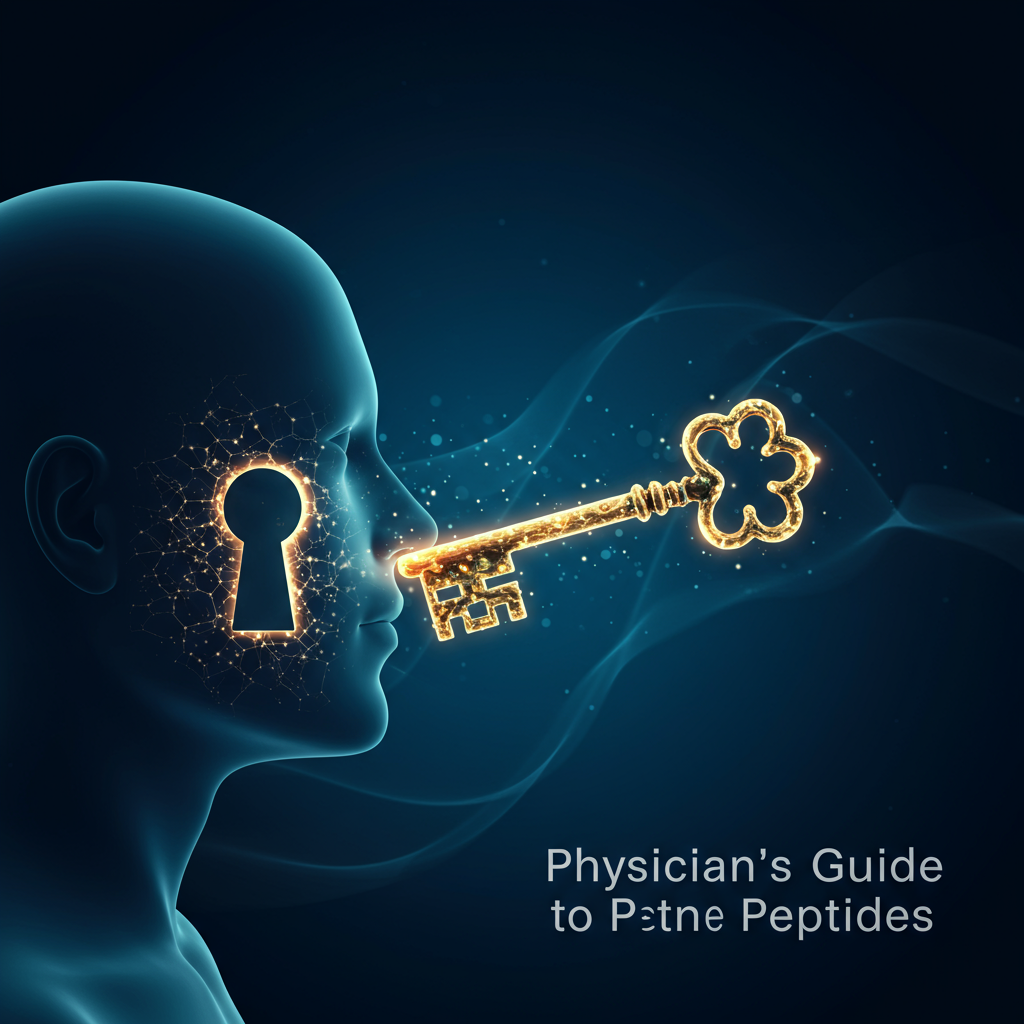It is a deeply frustrating experience: you are diligently managing your diet, committing to exercise, and doing everything you are “supposed” to do, yet the scale refuses to budge. This stubborn plateau is often dismissed as a lack of willpower, but the reality is frequently more complex. You may be facing what is known as ‘weight loss resistance’.
The challenge of losing weight isn’t just about calories in versus calories out; it’s a battle against a complex web of hormonal signals that can actively work against your best efforts. When these signals are out of balance, your body can cling to fat, slow your metabolism, and increase your hunger, making sustainable weight loss feel impossible.
This is where peptide therapy offers a modern, medical approach to rebalancing your body’s internal chemistry. This guide, created by the medical experts at Philly Wellness Center, goes beyond a basic explanation of peptides. We will provide a comprehensive strategy to help you break through resistance, lose fat while preserving essential muscle, and manage your health journey safely and effectively. We will cover the science of how these powerful molecules work, compare the leading options, detail a proactive plan for managing side effects, and present a holistic protocol for achieving lasting success.
Why traditional diets fail: the science of peptide therapy for weight loss resistance
What is ‘weight loss resistance’ from a medical perspective?
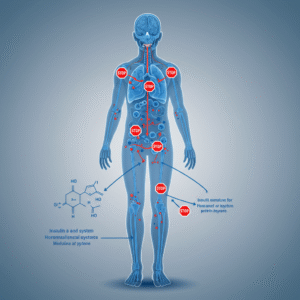
From a medical standpoint, ‘weight loss resistance’ is not a failure of character; it is a physiological condition. It’s a sign that your body’s metabolic and hormonal systems are not functioning optimally. This can be driven by several factors, including:
- Insulin resistance: When your cells don’t respond properly to the hormone insulin, your body struggles to process sugar, leading to increased fat storage.
- Leptin resistance: Leptin is the hormone that signals to your brain that you are full. In leptin resistance, your brain doesn’t receive this signal, leading to persistent hunger and overeating.
- Slowed metabolism: Chronic dieting or age can cause your metabolic rate to decline, meaning your body burns fewer calories at rest.
These underlying issues create a metabolic environment where your body is primed to store fat, not burn it, regardless of your diet and exercise efforts.
The hormonal key: how peptides rebalance your body’s weight control system
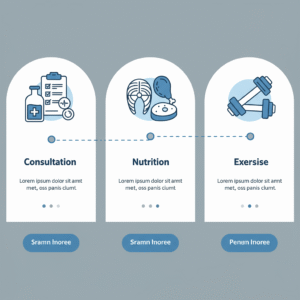
Peptide therapy directly addresses these hormonal imbalances by using specific protein chains to mimic or stimulate your body’s natural signaling processes. Two key classes of peptides are at the forefront of weight loss:
- GLP-1 Agonists (e.g., Semaglutide, Tirzepatide): These peptides mimic the natural hormone Glucagon-Like Peptide-1 (GLP-1). They work by slowing down how quickly your stomach empties, which keeps you feeling fuller for longer. Critically, they also act on the appetite centers in your brain to reduce hunger signals and regulate your blood sugar, directly combating issues like insulin resistance.
- GHRH/GHRPs (e.g., CJC-1295/Ipamorelin): This combination works by stimulating your pituitary gland to produce and release more of your body’s own growth hormone. This is crucial because healthy growth hormone levels are linked to a higher metabolism, an increased ability to burn fat for energy, and the preservation of lean muscle tissue.
Beyond appetite suppression: targeting fat loss while preserving muscle
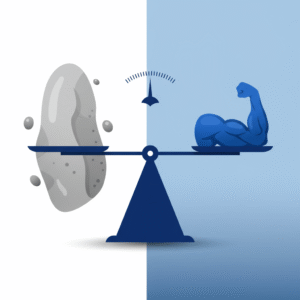
A major pitfall of traditional, rapid weight loss is the loss of metabolically active lean muscle along with fat. This not only diminishes strength but also lowers your metabolism, making it easier to regain weight in the future. The goal should always be ‘quality weight loss‘—selectively losing fat mass while protecting muscle.
This is where a strategic approach to peptides for weight loss resistance shines. While GLP-1 agonists are masters of appetite control, peptides like CJC-1295/Ipamorelin specifically support this goal of body recomposition. By optimizing growth hormone levels, they encourage your body to use stored fat as its primary fuel source while helping to maintain, or even build, lean muscle mass, particularly when combined with proper nutrition and exercise.
A comparative guide to the leading weight loss peptides
Navigating the world of peptide therapy can be confusing. Here, we break down the most effective and clinically studied options to help you understand which might be best suited for your specific goals.
The appetite and satiety regulators: GLP-1 and dual GIP/GLP-1 agonists
- Semaglutide (Wegovy®, Ozempic®): As a GLP-1 agonist, semaglutide is a powerful tool for appetite control. By slowing digestion and signaling satiety to the brain, it effectively reduces hunger and caloric intake. Clinical trials have consistently shown it leads to significant weight loss, making it a cornerstone therapy for individuals whose primary challenge is managing constant hunger.
- Tirzepatide (Zepbound™, Mounjaro®): Tirzepatide represents the next evolution in this class of medication. It is a dual-agonist, acting on both GLP-1 and GIP (Glucose-dependent insulinotropic polypeptide) receptors. This dual action appears to have a synergistic effect on appetite and metabolism, and as a comprehensive NCBI review of Tirzepatide shows, this often leads to superior weight loss results compared to GLP-1s alone.
The metabolic and body composition enhancers
- CJC-1295/Ipamorelin: This is not one peptide, but a powerful combination. CJC-1295 is a Growth Hormone Releasing Hormone (GHRH) and Ipamorelin is a Growth Hormone Releasing Peptide (GHRP). Together, they create a potent, natural pulse of growth hormone from your own body. This combination is ideal for body recomposition—using peptides for weight loss and muscle gain—as it helps boost metabolism, target stubborn fat stores, and support the preservation of lean tissue.
- AOD-9604: This peptide is a fragment of the human growth hormone molecule. Its primary function is to stimulate fat breakdown (lipolysis) and inhibit the formation of new fat cells. It is specifically designed to target fat burning without influencing blood sugar levels or overall growth, making it a highly targeted option for individuals focused purely on reducing body fat.
Comparing top peptides: a summary for your goals
| Peptide(s) | Primary Goal | Mechanism of Action | Average Expected Results |
|---|---|---|---|
| Semaglutide | Maximum Appetite Control | GLP-1 Agonist | Significant weight loss, strong hunger reduction |
| Tirzepatide | Maximum Weight Loss | Dual GLP-1/GIP Agonist | Superior weight loss, strong hunger reduction |
| CJC-1295/Ipamorelin | Fat Loss & Muscle Gain | GHRH/GHRP Combination | Moderate fat loss, improved body composition |
Are weight loss peptides safe? a proactive plan for managing risks
Yes, when prescribed and monitored by a qualified physician, FDA-approved peptide therapies are considered safe and effective for their indicated use. However, like any potent medication, they carry potential side effects and risks that must be understood and managed proactively.
Understanding and managing common peptide side effects
The most common side effects associated with GLP-1 agonists are gastrointestinal in nature. These can include nausea, constipation, diarrhea, and fatigue. While uncomfortable, they are often transient and can be effectively managed with a few key strategies:
- Titration: Your physician will always start you on a low dose and gradually increase it over weeks or months. This allows your body to adapt slowly, minimizing side effects.
- Dietary Choices: Eating smaller, more frequent meals and avoiding high-fat or greasy foods can significantly reduce nausea.
- Hydration: Staying well-hydrated is crucial for managing both constipation and fatigue.
- Meal Timing: Avoid lying down immediately after eating to help with digestion and reduce any feelings of reflux.
A note on serious risks and long-term safety
It is essential to be transparent about the more serious risks. The official FDA prescribing information for semaglutide includes a boxed warning regarding a risk of thyroid C-cell tumors. This warning is based on studies in rodents, and it is not known if it translates to the same risk in humans. However, these medications are contraindicated for individuals with a personal or family history of medullary thyroid carcinoma or Multiple Endocrine Neoplasia syndrome type 2 (MEN 2).
Regarding the long-term side effects of peptides for weight loss, the current clinical trial data is robust for several years of use, demonstrating a favorable safety profile. As these medications are used more widely, our understanding will continue to grow.
The critical importance of medical supervision
The safety and efficacy of peptide therapy are entirely dependent on using the correct, regulated product under the care of a physician. Recently, the market has been flooded with unregulated, “research-only” peptides sold online. These products are not FDA-approved and may contain impurities or incorrect dosages. The FDA has issued a stark FDA warning on unapproved peptide drugs, highlighting the potential dangers. A qualified medical provider is your essential partner in ensuring you receive a safe, effective, and authentic product.
The personalized peptide therapy journey: a holistic protocol for success
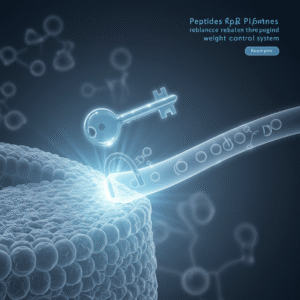
Effective peptide therapy is not a single injection; it is a comprehensive program where medication is a catalyst for broader lifestyle improvements. At Philly Wellness Center, we guide patients through a holistic protocol designed for lasting results.
Step 1: your comprehensive medical consultation
Your journey begins with a thorough evaluation. This includes a deep dive into your medical history, a discussion of your personal goals and past struggles, and comprehensive metabolic bloodwork. This data allows us to understand your unique hormonal landscape and determine which peptide—and at what dosage—is the right choice to help you overcome your specific form of weight loss resistance.
Step 2: integrating targeted nutrition to prevent muscle loss
While peptides help you burn fat, your diet provides the building blocks to protect your muscle. We emphasize a high-protein nutritional strategy, typically recommending an intake of 1.2 to 1.6 grams of protein per kilogram of your ideal body weight. This sends a powerful signal to your body to preserve lean mass during weight loss. Excellent sources include:
- Lean meats (chicken breast, turkey)
- Fish (salmon, tuna)
- Eggs and Greek yogurt
- Legumes and tofu
Step 3: leveraging exercise for optimal body composition
Exercise is the final piece of the puzzle. While cardiovascular activity is great for heart health, resistance training is vital during peptide therapy. Lifting weights or performing bodyweight exercises 2-3 times per week sends the definitive “keep this muscle” signal to your body. This synergy—peptides helping to burn fat while resistance training protects muscle—is the key to achieving a lean, strong, and metabolically healthy physique.
A word from our physician
“For over 25 years, I’ve seen patients struggle with the cycle of weight loss and regain. Peptide therapy represents a true scientific breakthrough, but it realizes its full potential when we see it as a tool to restore the body’s natural hormonal balance. By integrating this powerful science with personalized nutrition and targeted exercise, we move beyond simply chasing a number on the scale. We are aiming for true, sustainable metabolic health that lasts a lifetime.”
— Longevity expert with 25 years clinical experience, Philly Wellness Center
Frequently asked questions about weight loss peptides
What is the most effective peptide for weight loss?
Tirzepatide is currently considered the most effective single peptide for pure weight loss due to its dual-action mechanism. For individuals focused on fat loss combined with muscle preservation, a combination therapy like CJC-1295/Ipamorelin is often highly effective.
Is tirzepatide more effective than semaglutide for weight loss?
Yes, clinical studies have shown that tirzepatide generally leads to a greater percentage of weight loss than semaglutide. This is attributed to its ability to act on both GIP and GLP-1 receptors, creating a more powerful effect on appetite and metabolism.
How long does it take for peptide therapy to work for weight loss?
While some effects like appetite reduction can be felt within the first few days or weeks, significant weight loss is typically observed over several weeks to months. Results are progressive, with benefits building as you continue the physician-supervised protocol.
Can you use peptides for weight loss and muscle gain at the same time?
Yes, this is a primary goal of body recomposition protocols. Using peptides like CJC-1295/Ipamorelin can help stimulate your body’s own growth hormone to preferentially burn fat for energy while supporting the preservation and growth of lean muscle mass, especially when paired with adequate protein and resistance training.
What is the best peptide for female fat loss?
While peptide efficacy is not strictly dependent on gender, many women seek to optimize body composition by losing fat while maintaining muscle tone. For this reason, a combination therapy like CJC-1295/Ipamorelin is a popular and effective choice for targeting stubborn fat while supporting lean body mass.
Beyond the scale: your next step towards metabolic health
Peptides are a powerful scientific tool, but they are not a magic bullet. They are most successful when used to break through the hormonal barriers of weight loss resistance as part of a comprehensive, physician-supervised health strategy.
The ultimate goal is not just a lower number on the scale, but achieving ‘quality weight loss’—a transformation that leaves you leaner, stronger, and metabolically healthier. By losing fat, keeping muscle, and building sustainable habits, you can achieve results that last.
Ready to find out if a personalized peptide protocol is right for you? Contact the medical team at Philly Wellness Center to schedule your comprehensive weight loss consultation today.
